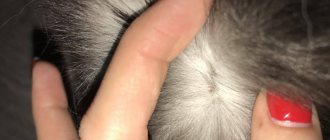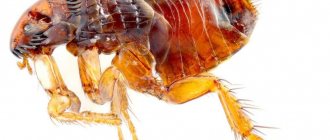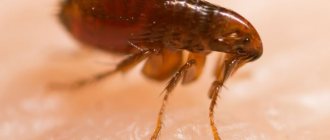Fleas are blood-sucking parasites that are quite common even in domestic cats. Infection with these insects causes anxiety, irritability, and unbearable itching in the animal, which causes scratching to appear on the body. If the owner does not take measures to remove them, the cat may develop serious diseases. In addition, although these parasites do not usually live on humans, their presence in the house can cause a lot of trouble for household members. Some human diseases are transmitted through these blood-sucking creatures.
Features and signs of fleas
The flea is a small insect (from one to five millimeters in length) brown in color, has six legs with characteristic bristles. It differs from other external parasites (ear and ixodid mites, lice, lice eaters, coccidia) by its incredible jumping ability due to its long hind limbs. It has a special mouth mechanism designed to pierce and suck the blood of the host.
At optimal temperatures and humidity, a generation of fleas can grow in ten days, they spread very quickly and live up to two years. Larvae can develop both on the body of the host and in its habitat. In the house, this could be bedding or an animal’s house, carpets, or furniture upholstery.
The initial infection of a pet is impossible to notice, but as the insect colony develops, the signs become obvious:
- the cat shows increased anxiety;
- often itches and bites teeth into fur and skin;
- characteristic red dots appear on his body - places of bites, from single to numerous;
- appetite decreases;
- looks lethargic and apathetic - anemia develops;
- worms often appear;
- an allergy occurs.
Also read the article about why a cat may itch if it doesn't have fleas.
Parasites appear again - what to do?
Sometimes pet owners are perplexed - they seem to have treated their pet’s fur, but after a while the animal begins to itch and bite fleas again. How so? The fact is that adult fleas live on animals, and they lay their eggs not only in the animal’s fur, but throughout the house:
- in crevices;
- behind the baseboard;
- in the pet's bedding;
- in carpets;
- in places where dust accumulates, etc.
Therefore, in order for flea eggs and the insects themselves to be destroyed, it is necessary to treat the entire room. It is advisable to do this at once so as not to give the parasites a chance to survive. Scientists have calculated how many eggs a flea lays. During her life, one female is capable of producing offspring from five hundred to two thousand eggs.
The pests are very small, the length of an adult individual barely reaches three millimeters. Flea eggs are even smaller. They have a round shape and white color. Detecting flea eggs, photos of which can be seen in the article, is extremely difficult. But you need to know where the flea can lay them. Then the problem of how to destroy flea eggs is much easier to solve.
How to check a cat for fleas and why they are dangerous
If your cat is extremely restless and itches frequently, you should check for parasites:
- pay attention to the fact that the pet is scratching and biting its back and sides;
- by parting the fur, inspect the cat’s skin - the presence of scratches, wounds, and scratches signal danger;
- when combing a cat with a toothed comb, you can easily notice the eggs and excrement of parasites - grains of whitish and black color;
- When bathing a cat, it is easy to detect the insects themselves - they tend to leave the carrier, but cannot move when wet.
If a cat has fleas, immediate measures must be taken to get rid of them.
Infestation is dangerous for your pet for many reasons. In addition to direct itching and anxiety, with an increase in the number of blood-sucking parasites, he may develop serious illnesses:
- allergies - flea saliva contains up to fifteen components that provoke a reaction;
- dermatitis - occurs as a result of allergies;
- helminthic infestation - parasites are usually infected with worm larvae (usually cestodes);
- fungal infection;
- anemia due to blood loss;
- decreased immune defense of the body;
- infectious anemia - hemobartonellosis - when bitten by an infected insect or infection through wounds;
- tularemia is a severe bacterial disease.
If the cat's damage is significant, people are also at risk. Fleas do not live on a person, but even with a single insect bite, he can be infected with many infectious diseases - fungal, helminthiasis, tularemia, typhoid, plague.
There are many preventive measures that can protect your pet and people from the danger of infection. And if fleas have already appeared in the house, then insecticidal treatment of the animal will be the best way to combat the infestation.
Harm to humans
The damage caused by ectoparasites to people is as follows:
- Bites.
- Transmission of contagious diseases.
Bites
A flea bite is regarded by the body as an irritant:
- A rash appears.
- Scratching appears, fraught with the development of suppuration.
- Dermatitis occurs, which can transform into pyoderma.
- Superficial lymph nodes become hypertrophied.
- Insomnia, migraine, diarrhea, and difficulty breathing develop.
Fleas are stuck
Transmission of contagious diseases
Cat fleas transmit the following infectious diseases to humans:
- Anthrax.
- Tifa.
- Encephalitis.
- Brucellosis.
- Worms.
How does a cat get fleas if he doesn't go outside?
A cat can easily become infected with fleas. She doesn't have to walk outside to do this. Infection can occur:
- upon contact with stray animals (cats, dogs, birds), if they get into the house, or with other pets, if they go outside, for example, a dog, or new pets;
- when visiting a veterinary clinic;
- through a person’s shoes and clothing;
- insects can themselves enter the house (entrance, balcony, etc.);
- in contact with rodents (mice, rats).
Also read the article about why even a domestic cat can have fleas and what to do in this case.
Change in animal behavior
In addition to visual manifestations on the skin and hair loss, the psycho-emotional state of the animal changes. Due to severe, incessant itching due to an allergic reaction, the cat’s appetite decreases or completely disappears. The pet does not walk, becomes passive, spends most of its time lying down, scratching its skin.
Some cats, instead of passivity and apathy, on the contrary, may behave differently: their irritability increases, excessive aggressiveness occurs, which increases even more when the owner tries to touch damaged areas of the skin. The reaction to stroking the fur is a pitiful, prolonged meow.
How to remove fleas from a cat
Flea infestation can be successfully cured at any stage. Modern veterinary medicine offers a large selection of means for preventive protection and getting rid of these blood-sucking parasites:
- Anti-flea collars are an excellent preventative measure for outdoor cats. It needs to be changed once a month. May cause allergies.
- Drops against parasites - easily applied to the withers, the active ingredients quickly spread over the skin, destroying fleas. The effect lasts from two to four weeks. After applying the product, the cat should not be washed for two to three days. For the same period, it is worth limiting his contact with children. Allergic reactions may occur.
- Special shampoos for cats contain insecticides with a strong odor that kill and repel insects. The effect of using the product is not long-lasting; after a few days, use of the shampoo should be repeated. The most common remedy due to low toxicity.
- Flea sprays and aerosols. In terms of degree of impact, they are most effective. But due to their high toxicity, they must be used with caution. They are usually prescribed for high levels of infestation.
- Ointments. Easy to use and affordable.
- Powders are quite effective and low-toxic. The disadvantage is that it is difficult to apply to the skin.
- Special insect repellent powders are designed to be applied to the fur of an infected animal. The difficulty is that you should not allow your pet to lick itself for thirty minutes. Requires reapplication every three to four days.
- Tablets and injections. Easy to use, but highly toxic. Used in case of high degree of damage as prescribed by a veterinarian.
- Anti-flea comb for combing out parasites.
- Folk remedies - tar soap, saline solution, various herbs - all of them are used to bathe your pet.
At the same time as using flea treatments on your pet, you should also get rid of insects indoors.
It is advisable to treat soft surfaces, especially the cat’s bed and the places where he usually sleeps, with hot steam using a steam generator. Carry out a thorough cleaning of the house or apartment, first with a vacuum cleaner, then damp with disinfectants. Treat the room with an insecticidal agent in the absence of people and animals.
It must be remembered that all insecticides are highly toxic substances. When using them, precautions should be taken:
- when using, use rubber or medical gloves;
- Make sure that the products do not get into the eyes or mucous membranes; if this happens, rinse the affected areas with plenty of water, or, as a last resort, consult a specialist.
Read more in the article on how to get rid of fleas on the Mister Cat portal.
How to treat bite sites?
Although the answer to the question of whether fleas live on humans is negative, the danger posed by these jumping cat parasites cannot be ruled out in any case.
Having found bite marks, the part of the body where they are found should be washed with warm water and antiseptic soap and dried. Then apply an antiseptic solution to the skin, especially in cases where the person has been severely bitten. Recommend:
- an aqueous solution of vinegar or citric acid;
- calamine solution;
- hydrocortisone ointment;
- Fenistil-gel.
Calamine solution is a natural remedy. It has antiseptic properties, reduces inflammation, relieves itching, swelling, and redness. Suitable for children. Side effects are minimal.
Hydrocortisone is a hormonal drug that relieves itching and effectively fights inflammatory processes. There are contraindications and side effects.
Fenistil-gel is an antihistamine (anti-allergic) and anesthetic drug for children after 1 month and adults, relieves itching and burning of the skin. The basis of the drug is dimethindene. There are side effects and contraindications.
Before using these products, you should consult your doctor to avoid side effects and allergic reactions.
Flea infestation in a kitten
Fleas pose a much greater danger to a small kitten than to an adult animal. They are more susceptible to allergies, helminthic infestations, anemia and rapid exhaustion due to insufficient immune forces of the body.
Dealing with fleas on a kitten is more difficult, since any drugs used to combat them are toxic to one degree or another.
Babies up to a month old can be combed daily with a flea comb. Every day, the litter must be processed at high temperatures, while using disposable diapers, making sure to dispose of old ones. You can use folk remedies with caution, for example, bathing with tar soap.
The room where the mother and kittens are kept is thoroughly vacuumed once a day. Even if these measures do not help to completely get rid of insects, they will significantly reduce the intensity of damage to children.
From one month of life, your pet can be given an anti-flea drug. All products are usually available in dosages for adult cats and kittens. They should be used carefully, observing the kitten's reaction to prevent poisoning.
Fleas in a pregnant and lactating cat
If fleas are found on a female during pregnancy, all measures should be taken to get rid of them before the kittens appear. Treat all soft surfaces in the house with steam, including bedding and animal toys (or boil them), wet clean the room and treat it with insecticides (the cat should not be in the treated room).
For a pregnant cat, anti-flea products are selected with special care and caution. It is better to seek advice from a veterinarian.
Before using the product, the cat should be thoroughly combed. Processing must be carried out strictly following the instructions.
If parasites are found in a nursing mother, then newborn kittens also have them, which means the situation is even more acute.
The use of any drug will lead to severe intoxication of animals - after all, the mother constantly licks herself and her babies. Therefore, you should use only approved products - it is most convenient to treat the female with drops on the withers for nursing cats. And, of course, boil the litter daily and clean and disinfect the room.
The use of a special anti-flea shampoo is also allowed, but not in the first week or two after birth.
Consequences of allergies
Severe itching of the skin, which occurs in response to flea saliva, causes the cat to actively itch and bite the skin with its teeth. This leads to mechanical damage to the epidermis and the appearance of open wounds. As a result, a favorable environment for secondary infection is created. Infection aggravates the course of the allergy and can lead to the formation of large inflammatory areas in which pus accumulates.
The resulting wounds contain pathogenic fungi and bacteria, which are not at all easy to deal with.
Allergies also have an extremely negative effect on the animal’s immune system. Suppressed immunity reduces the body's resistance to various viruses and infections. The cat's general condition and behavior are only getting worse.
In addition, allergies can trigger the development of Quincke's edema. This is a complex pathological condition that can lead to the death of an animal due to suffocation.
Prevention
- in case of frequent trips to the country or out of town, stock up on anti-flea spray or special drops on the withers;
- protect the cat from contact with stray and any random animals;
- Vacuum and wet clean the room where your pet lives every day;
- Wash or steam animal beds, houses, and toys often enough;
- be attentive to the cat’s behavior, and at the slightest suspicion of the presence of fleas, conduct an examination;
- If parasites are detected, do not postpone measures to combat them;
- undergo periodic examination by a veterinarian.
1111











